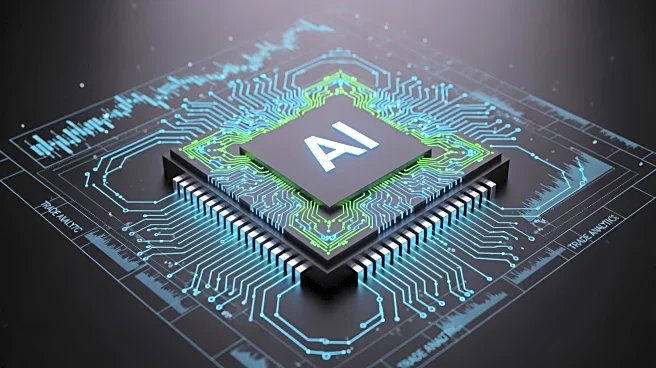What's Happening?
A recent study published in the International Journal of Mathematical Education in Science and Technology examines the capabilities of ChatGPT, a large language model, in solving a 2,400-year-old math problem originally posed by the Greek philosopher
Socrates. The problem involves doubling the area of a square, a task that requires understanding geometric principles. The study, led by Dr. Nadav Marco from the Hebrew University of Jerusalem and Professor Andreas Stylianides from Cambridge, aimed to determine whether ChatGPT could solve the problem using reasoning rather than innate knowledge. The researchers found that ChatGPT improvised a solution, similar to a human student, by incorrectly stating that the diagonal of the square could not be used, indicating that the AI was generating knowledge rather than retrieving it from pre-existing data.
Why It's Important?
This study highlights the potential of AI models like ChatGPT to mimic human-like reasoning and problem-solving abilities. The findings suggest that AI can generate new knowledge through improvisation, rather than solely relying on pre-programmed data. This has significant implications for the development of AI technologies, as it demonstrates the potential for AI to engage in complex reasoning tasks. The ability of AI to learn and adapt in ways similar to human cognition could lead to advancements in various fields, including education, where AI could be used to assist in teaching complex subjects. However, it also raises questions about the limitations and ethical considerations of AI systems that can simulate human thought processes.
What's Next?
The study opens the door for further research into the capabilities of AI in educational settings and other areas where reasoning and problem-solving are crucial. Researchers may explore how AI can be integrated into educational tools to enhance learning experiences. Additionally, the ethical implications of AI systems that can mimic human reasoning will likely be a topic of discussion among policymakers and technologists. As AI continues to evolve, understanding its potential and limitations will be essential in shaping its role in society.
Beyond the Headlines
The study's findings could influence the way AI is perceived in terms of its ability to replicate human intelligence. It challenges the notion that AI is limited to data retrieval and suggests that AI systems can engage in creative problem-solving. This could lead to a reevaluation of how AI is utilized in various industries, potentially expanding its applications beyond current expectations. The ethical considerations of AI systems that can simulate human reasoning will also need to be addressed, particularly in terms of accountability and decision-making processes.
















